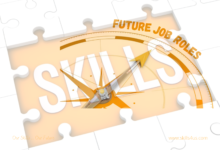
A Creative Work Environment Makes Your Team More Achieved And Productive
Creativity is not only important to a specific category of people, nor is it an unnecessary “extra” feature for them. On the contrary, it has become necessary to have creativity as an additional advantage for human resources working in organizations. And if you want your employees to be a more achieved and productive team, you need every employee to be at their creative peak. Creativity allows finding alternative solutions to difficult and complex problems. And enables new ideas to emerge and reshape the organization’s assumptions and future directions. It also helps employees to improve their workflow and methods. Most importantly, it inspires employees and makes them a more achieved and productive team.
Note that this does not necessarily mean hiring more creative people and including them in your work team. Even though some people may be born with a higher tendency towards creativity. This does not mean that others are inherently less creative. While everyone has a degree of creative spark within them, as a successful and distinguished business leader. All you have to do is allow that creativity to grow.
Hiring creative candidates may help, but your primary goal and priority should be to create an environment that nurtures creativity in everyone without exception.
To find and create a creative work environment, I suggest you adopt the following methods in your organization and with your work team:
A) Adopt flexible work programs
Several studies have shown that flexible work programs lead to higher rates of overall productivity and higher job satisfaction. So the result of such studies should encourage you to adopt the flextime policy because it leads to more creativity.
Flexible work programs include dismantling the mandatory working day (from 09:00 to 17:00). Such programs allow for flexible hours, work days from home, or even unlimited vacation. These programs must have a certain degree of flexibility to accommodate employees. It knows that when employees are not focused on punctuality, waiting around the clock, or rushing back from their lunch break. They have more time to decompress and naturally find abstract solutions.
As a future manager, by implementing flexible work programming, you allow your employees to “work outside the box” to “think outside the box.”
B) Allow and schedule breaks
Several studies have proven that allowing breaks increases employee productivity. And job satisfaction and increases their ability to improve creative thinking. Promoting a culture of permissiveness and organizing breaks in your organization’s work gives it a sense of comfort. And motivation for more activity, creativity, and achievement.
So when you don’t pressure your employees to complete a task, it enables them to complete it more relaxed and thoughtfully. Because during breaks, they will be free to step away. And think casually about the problem and eventually come up with a reasonable alternative solution.
C) Actively listen to new ideas
One of the biggest obstacles to productivity and achievement at work is the absence of creativity and the lack of listening to it. Your employees may come up with great, innovative, and intelligent ideas, but if they don’t feel comfortable and free to come up with and discuss them, you’ll never hear about them.
To resolve this contradiction, foster a culture of actively listening to every new idea, even the bad ones and the ones that conflict with your thinking. You don’t have to act on it but value it, give honest feedback and appreciate and thank employees for their ideas. As a successful business leader, doing this will create an atmosphere and environment for generating positive thoughts, which should persist over time.
D) Add sensual and refreshing effects to the workplace
Often the most creative experiences come from combining two unrelated ideas. So, revitalizing the workplace by adding sensory stimuli can contribute to employees’ flow of unrelated, non-sequential ideas. It can also help employees find new inspiration.
Freshen up the workplace, for example, by hanging purposeful, thought-provoking artwork on office walls. Or make on fresh and fragrant scents plus green ornamental plants a permanent fixture in offices. Or play soft, unconventional music distributed through audio equipment in offices and everywhere. Doing so will help employees think new ways and increase their motivation through their creative environment. Consequently, your team will feel happier and more productive and creative.
E) Foster a “teamwork” mindset
It is rare for a creative idea to pop up in one person’s head automatically. After discussion with team members, the best creative ideas have been modified and added. Creativity is a collective sport, so you should make it your responsibility as a successful business leader to help your team members work together.
Facilitate a “teamwork” mentality by removing barriers between you and your team members. Conduct group exercises and give team members opportunities to connect. Doing that will help them trust each other and work together to bring new ideas to life.
Creativity doesn’t come naturally to everyone. But under these suggested conditions, you’ll find your employees have more ideas, better expectations, and more exciting solutions to the problems your organization and business face. The more you work with your employees with a “teamwork” mentality. And the more comfortable your team is in your creative environment, the more creative ideas you can get.
As a distinguished business leader, make your work environment creative because the work environment is where the employee spends most of the day, and it is the most influential in his life. It leads to the creation of a more achieved and productive team for your organization .



